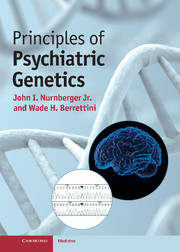Book contents
- Principles of Psychiatric Genetics
- Principles of Psychiatric Genetics
- Copyright page
- Contents
- Contributors
- Preface
- Chapter 1 Contribution of genetic epidemiology to our understanding of psychiatric disorders
- Chapter 2 A basic overview of contemporary human genetic analysis strategies
- Chapter 3 DNA methods
- Chapter 4 In silicoanalysis strategies and resources for psychiatric genetics research
- Chapter 5 Gene expression studies in psychiatric disorders
- Chapter 6 Pharmacogenetics in psychiatry
- Chapter 7 Functional validation of candidate genetic susceptibility factors for major mental illnesses
- Chapter 8 Epigeneticmechanisms in drug addiction and depression
- Chapter 9 Panicdisorder
- Chapter 10 The genetics of the phobic disorders and generalized anxiety disorder
- Chapter 11 Genetic contributions to obsessive–compulsive disorder (OCD) and OCD-related disorders
- Chapter 12 Post-traumaticstress disorder
- Chapter 13 Antisocialbehavior: gene–environment interplay
- Chapter 14 Learning disabilities
- Chapter 15 Attention-deficit hyperactivity disorder
- Chapter 16 Autism and autism spectrum disorders
- Chapter 17 The genetics of bipolar disorder
- Chapter 18 Thegenetics of major depression
- Chapter 19 The genetics of schizophrenia
- Chapter 20 The genetics of anorexia and bulimia nervosa
- Chapter 21 Genetics and common human obesity
- Chapter 22 Alcoholism
- Chapter 23 Nicotine dependence
- Chapter 24 Human molecular genetics of opioid addiction
- Chapter 25 Genetics of stimulant dependence
- Chapter 26 Genetics of personality disorders
- Chapter 27 Ethical issues in behavioral genetics
- Chapter 28 Genetics of Tourette syndrome and related disorders
- Chapter 29 Endophenotypes in psychiatric genetics
- Chapter 30 Developmental disorders
- Chapter 31 Alzheimer's disease
- Index
Chapter 8 - Epigeneticmechanisms in drug addiction and depression
Published online by Cambridge University Press: 05 October 2012
- Principles of Psychiatric Genetics
- Principles of Psychiatric Genetics
- Copyright page
- Contents
- Contributors
- Preface
- Chapter 1 Contribution of genetic epidemiology to our understanding of psychiatric disorders
- Chapter 2 A basic overview of contemporary human genetic analysis strategies
- Chapter 3 DNA methods
- Chapter 4 In silicoanalysis strategies and resources for psychiatric genetics research
- Chapter 5 Gene expression studies in psychiatric disorders
- Chapter 6 Pharmacogenetics in psychiatry
- Chapter 7 Functional validation of candidate genetic susceptibility factors for major mental illnesses
- Chapter 8 Epigeneticmechanisms in drug addiction and depression
- Chapter 9 Panicdisorder
- Chapter 10 The genetics of the phobic disorders and generalized anxiety disorder
- Chapter 11 Genetic contributions to obsessive–compulsive disorder (OCD) and OCD-related disorders
- Chapter 12 Post-traumaticstress disorder
- Chapter 13 Antisocialbehavior: gene–environment interplay
- Chapter 14 Learning disabilities
- Chapter 15 Attention-deficit hyperactivity disorder
- Chapter 16 Autism and autism spectrum disorders
- Chapter 17 The genetics of bipolar disorder
- Chapter 18 Thegenetics of major depression
- Chapter 19 The genetics of schizophrenia
- Chapter 20 The genetics of anorexia and bulimia nervosa
- Chapter 21 Genetics and common human obesity
- Chapter 22 Alcoholism
- Chapter 23 Nicotine dependence
- Chapter 24 Human molecular genetics of opioid addiction
- Chapter 25 Genetics of stimulant dependence
- Chapter 26 Genetics of personality disorders
- Chapter 27 Ethical issues in behavioral genetics
- Chapter 28 Genetics of Tourette syndrome and related disorders
- Chapter 29 Endophenotypes in psychiatric genetics
- Chapter 30 Developmental disorders
- Chapter 31 Alzheimer's disease
- Index
Summary
Keywords
- Type
- Chapter
- Information
- Principles of Psychiatric Genetics , pp. 79 - 89Publisher: Cambridge University PressPrint publication year: 2012



